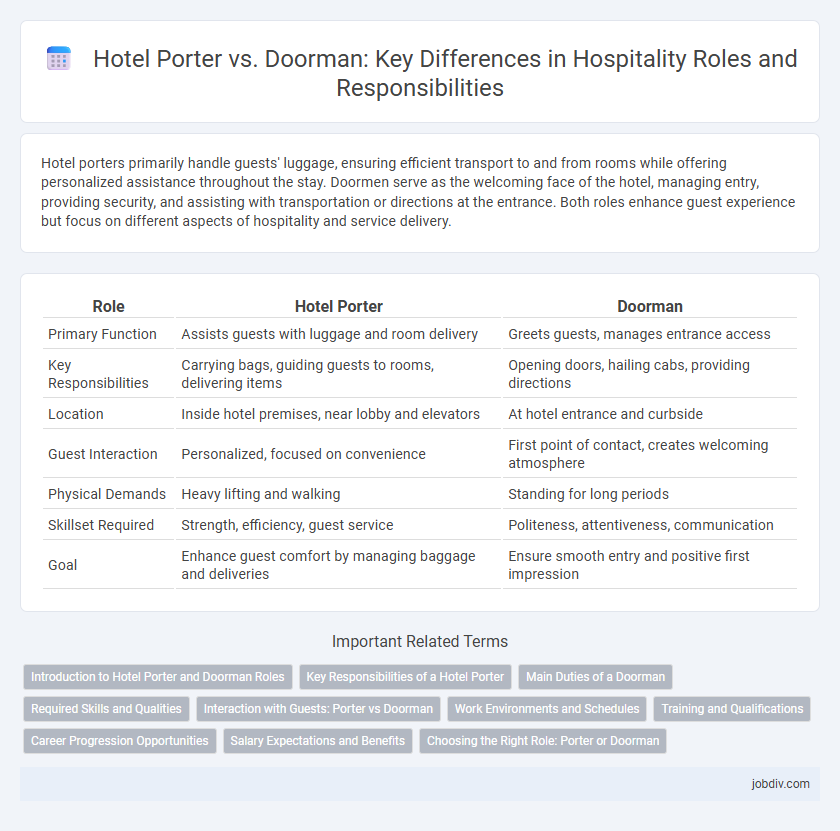Hotel porters primarily handle guests' luggage, ensuring efficient transport to and from rooms while offering personalized assistance throughout the stay. Doormen serve as the welcoming face of the hotel, managing entry, providing security, and assisting with transportation or directions at the entrance. Both roles enhance guest experience but focus on different aspects of hospitality and service delivery.
Table of Comparison
| Role | Hotel Porter | Doorman |
|---|---|---|
| Primary Function | Assists guests with luggage and room delivery | Greets guests, manages entrance access |
| Key Responsibilities | Carrying bags, guiding guests to rooms, delivering items | Opening doors, hailing cabs, providing directions |
| Location | Inside hotel premises, near lobby and elevators | At hotel entrance and curbside |
| Guest Interaction | Personalized, focused on convenience | First point of contact, creates welcoming atmosphere |
| Physical Demands | Heavy lifting and walking | Standing for long periods |
| Skillset Required | Strength, efficiency, guest service | Politeness, attentiveness, communication |
| Goal | Enhance guest comfort by managing baggage and deliveries | Ensure smooth entry and positive first impression |
Introduction to Hotel Porter and Doorman Roles
Hotel porters assist guests by handling luggage, providing directions, and ensuring a smooth check-in experience, often serving as the first point of contact in hotels. Doormen primarily focus on greeting guests, opening doors, managing vehicle arrivals, and maintaining security at the entrance. Both roles enhance guest satisfaction and contribute to the overall hospitality service but specialize in different aspects of guest interaction.
Key Responsibilities of a Hotel Porter
Hotel porters primarily manage guest luggage, ensuring efficient transportation from the lobby to guest rooms while maintaining careful handling to prevent damage. They provide essential support by assisting guests with directions, delivering amenities, and coordinating with housekeeping or maintenance to enhance guest satisfaction. Unlike doormen, who mainly focus on greeting guests and managing entry logistics, porters play a pivotal role in the overall guest experience through personalized service and operational support.
Main Duties of a Doorman
A doorman in hospitality primarily ensures the safety and security of hotel guests by controlling access to the premises and monitoring the entrance. They assist guests with luggage, provide directions, and hail transportation while maintaining a welcoming presence. Unlike a hotel porter who mainly handles baggage delivery and room service assistance, the doorman's role centers on guest interaction and entrance management.
Required Skills and Qualities
Hotel porters require strong physical stamina, excellent customer service skills, and the ability to handle luggage efficiently while maintaining a welcoming demeanor. Doormen must possess keen observation skills, a friendly attitude, and the ability to manage security by identifying guests and monitoring who enters the premises. Both roles demand clear communication, reliability, and a commitment to enhancing the overall guest experience in luxury hospitality settings.
Interaction with Guests: Porter vs Doorman
Hotel porters primarily engage with guests by assisting with luggage handling and guiding them to their rooms, providing personalized and direct support throughout their stay. Doormen focus on greeting guests, managing entry security, and facilitating easy access to the hotel by opening doors and hailing transportation. Both roles enhance guest experience, but porters offer more hands-on interaction, while doormen ensure a welcoming and safe arrival environment.
Work Environments and Schedules
Hotel porters often work behind the scenes, managing luggage and assisting with guest room transitions, primarily during daytime and peak check-in/out hours in hotels with high guest turnover. Doormen maintain a visible presence at a hotel's entrance, greeting guests and managing arrivals and departures, typically adhering to shifts that cover early mornings, evenings, and weekends to accommodate fluctuating guest traffic. Both roles require flexibility but differ in their work environments; porters operate mainly indoors with physical tasks, while doormen work outdoors or in lobby areas, exposed to varying weather conditions.
Training and Qualifications
Hotel porters typically undergo training focused on luggage handling, guest assistance, and basic property knowledge, emphasizing physical stamina and customer interaction skills. Doormen require specialized training in security protocols, crowd management, and local area awareness, often needing certifications in safety or emergency response. Both roles demand strong communication abilities and a service-oriented mindset, but doormen often have higher qualifications related to security and guest safety.
Career Progression Opportunities
Hotel porters often start with entry-level responsibilities such as luggage handling and room assistance, providing a foundation for advancing to supervisory roles or specialized departments within the hospitality industry. Doormen typically develop strong guest interaction and security skills, which can lead to career progression in guest services management or hotel security leadership. Both positions serve as crucial stepping stones, offering pathways to higher-level roles like concierge, front desk management, or hotel operations.
Salary Expectations and Benefits
Hotel porters typically earn an average salary ranging from $25,000 to $35,000 annually, with benefits including employee discounts, health insurance, and tips based on guest interactions. Doormen usually receive a higher income, averaging between $30,000 and $45,000 per year, often supplemented by gratuities and benefits such as union protections, health plans, and paid leave. Both roles prioritize customer service but differ in responsibility levels, which directly influences their salary expectations and associated benefits packages.
Choosing the Right Role: Porter or Doorman
Selecting between a hotel porter and a doorman depends on the specific guest service needs and operational goals of the property. Porters primarily handle luggage transport and room escorting, enhancing guest convenience within the hotel interior. Doormen focus on greeting arrivals, managing vehicle access, and offering street-side assistance, contributing to a welcoming first impression and security outside the building.
Hotel Porter vs Doorman Infographic

 jobdiv.com
jobdiv.com